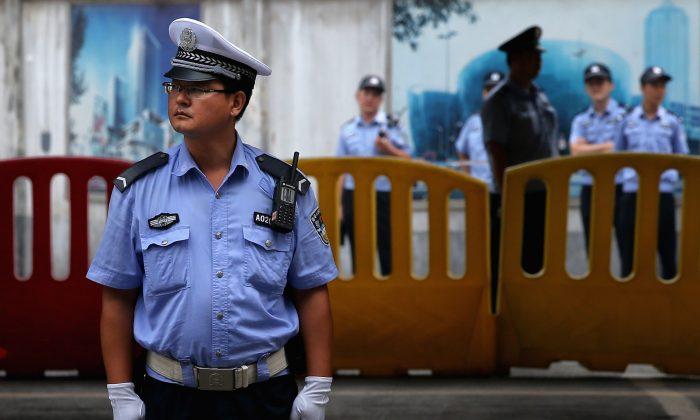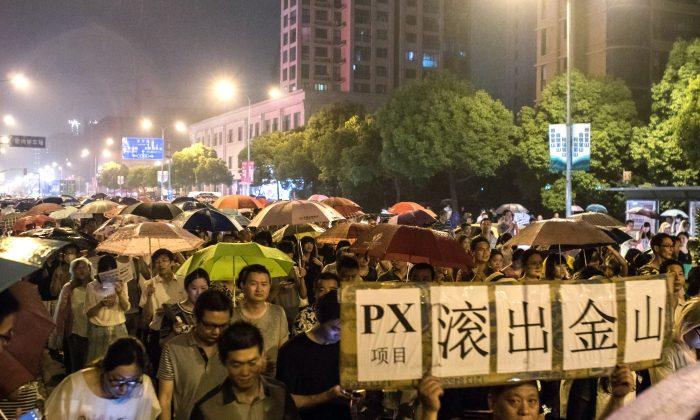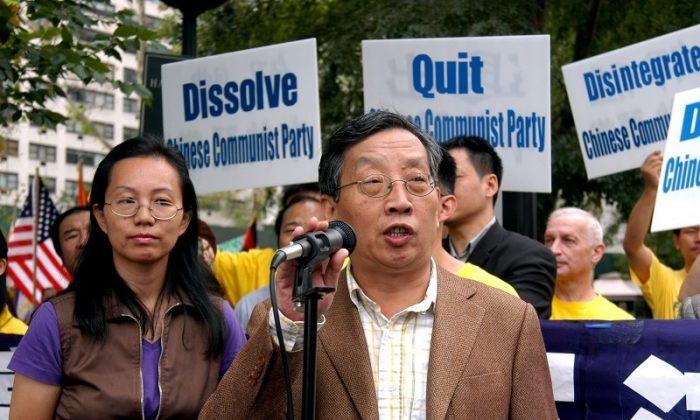China has launched a high-profile campaign against prostitution recently, with loud editorials in the state-run press and round-ups of hundreds of prostitutes who are humiliated in front of the cameras. No media organization in China is allowed to question the campaign, according to recent propaganda directives leaked online.
The purpose of the thunderous crackdown is to show that Communist Party leaders are serious about attacking corruption—and prostitution is a great hotbed of corruption.
Simultaneously, however, analysts are questioning whether the crackdown is really being conducted in earnest. Over the last few decades, prostitution has grown so much that it seems simply impractical to stamp out entirely. It’s a backbone industry of the country now.
Target Dongguan
The manufacturing city of Dongguan, in the south of China, was the first target of the arrests and propaganda. Official media congratulated the hardworking police who arrested nearly 1,000 prostitutes and clients in nearly 200 locations.
This is only a fraction of the sex industry in Dongguan, however: the sex industry there is had an annual turnover of 50 billion yuan ($8.2 billion) last year, about a seventh of the city’s GDP, said a source familiar with the industry in an interview with Oriental Morning Post, a newspaper in Shanghai.
Dongguan’s economic growth has been above the national average since the 1990s, when the sex industry there took off, the report said. Dongguan is also a manufacturing and assembly center, however.
The source told the Oriental Morning Post that there are 250,000 prostitutes in Dongguan, embedded in places of business like saunas, leisure clubs, hair salons, massage parlors, and nice hotels. Hundreds of thousands more are in associated industries, like jewelry, cosmetics, and transportation.
National Prostitution
Dongguan is perhaps an extreme example of what goes on across China.
Although the sex industry is not considered in the National Bureau of Statistics reports, some researchers in and outside China have looked at the issue.
Wu Hai, a hotel CEO in China, published an “Analysis of the China Sex Industry and Its Impact on Hotel Management” in 2012, which revealed some startling numbers.
The report indicates that the total value of prostitution each year is nearly 500 billion yuan ($82 billion) per year, and that there are around five million sex workers. The price of sex transactions vary depend on the place, but the nationwide average is about 200 yuan ($33) per incident, the report says.
The World Health Organization says that China had an estimated four to six million sex workers in 2008. The industry has expanded rapidly since 1990s.
‘Too Big To Fail’
He Qinglian, a Chinese economist now living in the United States, said that the sex industry makes a huge contribution to the Chinese economy.
In fact, it’s “too big to fail,” she wrote in a recent analysis for Voice of America’s Mandarin service.
“If China’s economy cannot create new jobs for these grassroots people, an industry that’s connected to 5-7 million people’s careers, and 20-30 million people’s livelihoods (including family members that sex workers need to support) will tenaciously come back, even though some of the authorities want to crackdown on it.”
Activists in China have called for decriminalizing the sex industry, in light of the recent crackdown and the entrenched nature of prostitution.
He Qinglian said that decriminalizing it would lessen the threat of triads to sex workers, encourage them to undergo regular health exams, and possibly decrease the instances of group sex, often reported to be ordered up by corrupt Chinese officials.
‘Gray Zone’
Rapid industrialization and modernization in China after the Cultural Revolution was the seed for the growth of the sex industry, according to Pan Suiming, president and professor at Institute of Sexuality Gender of Renmin University of China.
The reforms in the late 1970s led large numbers of Chinese to join the sex trade, after they had lost their land in the countryside. The influx of prostitutes served a rapidly growing rich population, Pan write in his “History and the Sex Industry.”
Official corruption has been another major stimulus to the growth of prostitution in China. Communist Party officials pay for their trysts with public funds, and sexual bribery is a constant in official transactions in China.
Chinese law says that prostitution is illegal, but it is so rampant as to render the law mostly meaningless—except when the authorities wish to carry out a political campaign.
“The sex industry in China has become a gray zone between the law and reality,” said Zhang Tianliang, an independent analyst of Chinese politics, in an interview.
“On the one hand the Communist Party wants to whitewash itself by not legalizing the sex industry. On the other hand, all levels of Party officials indulge themselves at those places, making it difficult to ban.”
Protection from officials and police is another reason why crackdowns are always short lived.
“The crackdown on prostitution always punishes the prostitutes, who have no political connections or power,” Zhang said. “A lot of the fines from those crackdowns go into peoples’ pockets. And the sex trade in some places is controlled by people with political ties.”





Friends Read Free